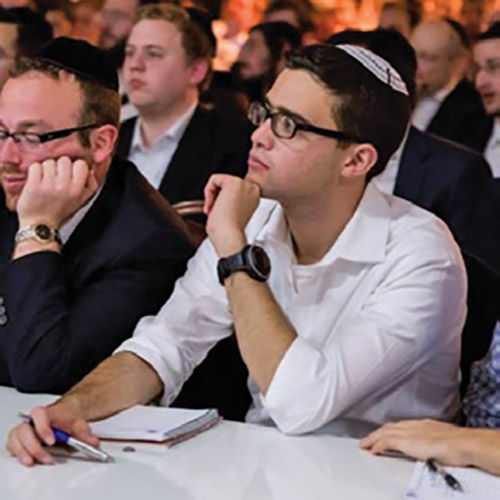

“We were slaves to Pharaoh in Egypt, but Hashem our God took us out from there with a strong hand and outstretched arm. And if the Holy One, blessed be He, hadn’t taken our ancestors out of Egypt, we and our children and grandchildren would still be slaves to Pharaoh in Egypt…”
After establishing the premise for sipur yetziat Mitzrayim in the rhetorical questions of Ma Nishtana, the Seder continues to a very simple yet powerful paragraph, which reminds us that we were slaves to Pharaoh in Egypt and God took us out by force. If God hadn’t taken us out, no matter how smart, persuasive or powerful we would become, each of us would still be slaves. This humbling sentiment ends with the reminder that “Kol hamarbe lesaper beYetziat Mitzrayim, harei zeh meshubach, and anyone who maximizes their telling over of the Exodus—this is praiseworthy.”
Nearly all of the commentaries on the Haggadah indicate that this paragraph serves as both an answer to Ma Nishtana and a fulfillment of the obligation to “matchil b’genut u’mesayem b’shevach—begin telling over the Exodus with negative/shameful aspects, and end in praise.” The reminder that we would also personally be slaves if not for God’s intervention so long ago is humbling and very effective at enabling us to feel as if we too were taken out of Egypt this hallowed night.
The effect of this statement is so strong that in the commentary on the Haggadah of Ri”Y ben Yakar (Rav Yehuda ibn Yakar, who lived in the 15th century CE), Rava and Rav Nachman are quoted as saying that the genut of our enslavement is the only one that should be mentioned tonight, for “kol inyan hayom hu yetziat Mitzrayim, the only matter of tonight is the Exodus.” However, other mentionings of genut are brought up soon afterward in the Haggadah: “Our forefather was once an idolater” and “An Aramean tried to destroy our forefather,” to name a few. These seem to be referencing different dark parts of our nation’s past, independent of the focus of tonight’s Seder—that our ancestor Terach was an idol worshiper and that Lavan almost destroyed Yaakov’s spirit don’t seem to directly relate to the enslavement and Exodus.
What place do these have at our Seder leil Pesach, especially in light of the strong statements quoted by Ri”Y ben Yakar?
One of the recurring themes of Magid, of sipur yetziat Mitzrayim as a whole, is the explicit link between the Exodus and the Brit Bein HaBetarim (the Covenant between the Parts) that our time in Egypt, our redemption and our return to the Promised Land are proof that God, in His mercy and kindness, fulfilled the promise He made with Avraham that we would be slaves in a foreign country, but eventually be let free and become a great people. All of the genut skeletons in our collective national closet, the historical dirty laundry we air at the Seder, are intrinsically part of the story of the enslavement itself; mentioning them highlights the greatness of our rise from the sands of slavery, and are more than relevant for they put the Exodus in a greater historical context.
As we sit around reading the Haggadah and remembering the enslavement while we ourselves are in the exile, our most shameful modern-day genut (or in a rebuilt Jerusalem still missing the Third Temple at its nucleus), we must remember that we are still part of that same covenant. Current events that have led to our people’s return to Zion beginning over a hundred years ago, and everything else since then, are part of our people’s return to greatness, the fulfillment of God’s promise that we would become a great nation in our land after our lengthy exile. Only, this time, the genut of a foreign religion symbolically sitting on the site of our past and future Temples isn’t the same shame of our idol-serving past, nor of “Arami oved avi.”
We are on the rise now, nearing the end of our final exile. The embarrassment we face as Jews afraid to wear our kipot or even practice religion in public in many parts of the Diaspora, or our inability to even pray at our nation’s holiest site in Jerusalem, are not genut to the same degree as we read on the Seder night. Rav Kook, zt”l, gave these embarrassments a different label: chevlei Mashiach, the great birth pangs that accompany, or to be more accurate, immediately precede, an even greater happiness.
So, as we sit down and read “Avadim Hayinu” together on the Seder night, let us reflect on how Jewish history as a whole led to our exile and enslavement, and how even the negative parts of our Jewish lives today are leading to our redemption. May we all merit a complete redemption very very soon, to celebrate Pesach next year in Jerusalem, our nation’s capital, together.
By Tzvi Silver/JLNJ Israel
Tzvi Silver, a Teaneck native, has been living in Israel since 2011. He is in his final year of studying electrical engineering at JCT-Machon Lev in Jerusalem, works as an investigator for Israel’s Ministry of Justice and serves as JLNJ and JLBWC’s senior Israel correspondent. He will be drafting into the IDF at the end of the year to serve an academic officer in his field.













